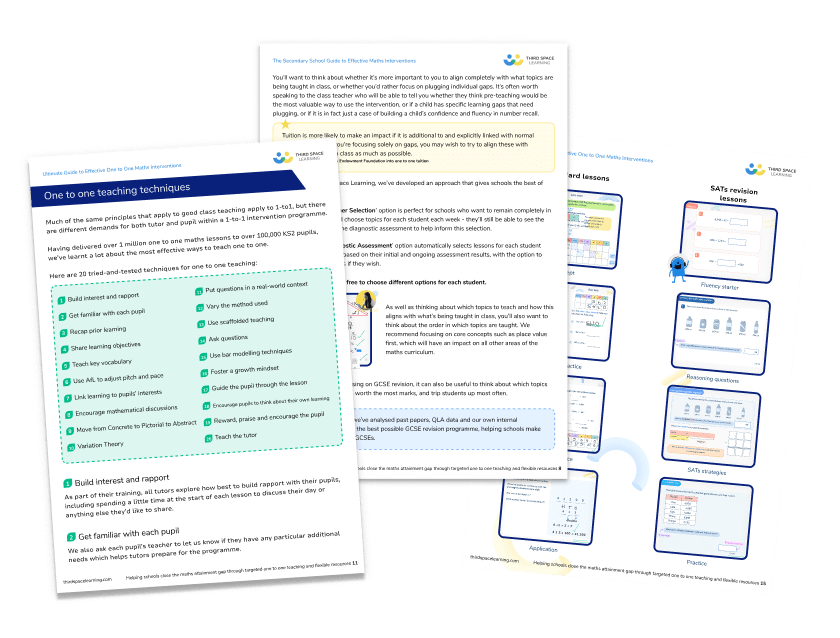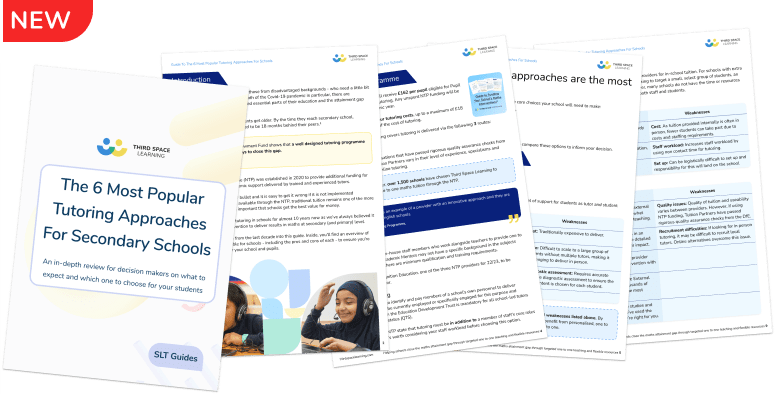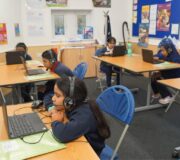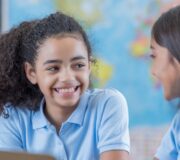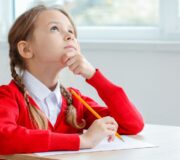Starting Up Maths Tutoring In Your School? Here’s What You Should Know
Maths tutoring is one of the most effective and evidenced ways to improve attainment. In the past, the only children who benefited were those whose families could afford to opt for private tuition from the best private maths tutors. Now, maths tutoring is increasingly recognised by schools as an effective approach to tackle the attainment gap.
This article guides you through the essential decisions you’ll need to make before your first tutoring session and how to make maths tutoring a success once you begin. We include insights from our years of experience as the UK’s largest provider of online one to one maths tutoring for schools alongside evidence and research to help you make an informed decision about your school’s tutoring approach.
Why is maths tutoring an effective intervention strategy for schools?
Maths is the most popular school tutoring subject, closely followed by the sciences at secondary and A-level (Bramble).
But why is this?
Maths is not inherently ‘difficult’, but unaddressed gaps are especially problematic.
The subject is cumulative, meaning concepts build on one another in a spiral curriculum. If a child does not have a solid understanding of essential foundational concepts, they will struggle to keep up and fall further behind in later years.
For this reason, the link between KS2 and GCSE performance is stronger in maths than in any other subject, including English and Science.
The perfect tutors and maths tutoring programmes help identify, target and close student learning gaps to accelerate progress.
Post-pandemic, maths was the subject most affected by learning loss. Disadvantaged students were disproportionately affected. These students cannot access private maths tutors and risk widening the maths attainment gap without extra support.
“Maths skills have a profound long-term impact on both individuals and society, and early difficulties in maths tend to be compounded as pupils move through their education. This drives a particularly strong link between maths attainment at Key Stages 2 and 4. There is therefore an urgent need to tackle learning loss in maths, particularly at primary school level.”
‘A Space for Maths’ – Centre for Education and Youth
Ultimate Guide To Maths Tutoring
Download this free guide for SLT and subject leaders to ensure that your tutoring interventions are effective and a good use of your budget.
Download Free Now!Funding your maths tutoring in school
Since 2013, Third Space Learning has worked with over 4,000 schools to provide online one to one maths tutoring and offered advice and support on how to use tuition funding for maths tutoring.
Schools can use pupil premium funding from the Department of Education to help fund maths tutoring for eligible disadvantaged students.
“Third Space Learning was an attractive proposition for us because the tutoring was one to one and because all the tutors were maths specialists. It was also a great way to use our Pupil Premium allowance.”
Catherine Prole, Deputy Headteacher St Michael’s Primary School, Trafford
Finding the right maths tutors
Finding the perfect maths tutor can feel overwhelming, but with a structured approach, you can identify a qualified tutor who meets your students’ needs. Here are some steps to guide you:
- Define your needs: Start by pinpointing the areas where you need assistance. Whether it’s Key Stage 2, GCSE maths, A-level maths, or further maths, understanding your needs will help you find a tutor with the right expertise.
- Check qualifications: Look for tutors with relevant qualifications, such as a degree in maths or a related field. This ensures they have a solid understanding of the subject matter.
- Experience: Prioritise tutors with experience in teaching maths, whether online or offline. Experienced tutors are more likely to have refined their teaching methods and can adapt to different learning styles.
- Check reviews: Read reviews from previous schools and students to understand the tutor’s teaching style and effectiveness. Positive feedback from others can be a good indicator of a tutor’s capability.
- Check availability: Ensure the tutor is available at times that suit your schedule. Consistent, regular sessions are key to making steady progress.
Third Space Learning’s qualified tutors are all maths undergraduates or postgraduates.
In addition to their extensive maths knowledge, Third Space Learning’s curriculum and pedagogy experts provide an intensive training programme and ongoing CPD to ensure tutors are up-to-date with the latest pedagogies and effective teaching strategies for Key Stage 2 through to GCSE.
Maths tutoring: 9 essential decisions before your first session
Once you’ve decided that maths tutoring is the right intervention for your school, there are several essential decisions you will need to make before your first session.
1. Establish what you want to achieve from the maths tutoring
Start with the issue at hand. What is the problem you are trying to solve?
Establish the goals of your tutoring programme using your knowledge of your school, students and context. Whether it is to increase confidence in maths, to improve exam technique, or to improve SATs or GCSE attainment, ensure it is a measurable goal so you can reflect on its success.
2. Choose who will receive maths tutoring
Choosing the right students for maths tutoring is crucial to ensure that the support provided is effective and impactful. Here are some key factors to consider when selecting students for maths tutoring:
- Identify struggling students: Idenitfy students who are struggling with specific maths concepts or topics. These students are likely to benefit the most from targeted support.
- Assess learning gaps: Conduct assessments to determine the current maths skills and knowledge gaps of your students. This will help you understand which students need the most support and in which areas.
- Consider learning strategies: Take into account the learning preferences of your students. Some students may benefit more from one-to-one tutoring, while others might thrive in small group sessions.
- Prioritize at-risk students: Focus on students who are at risk of falling behind their peers or not meeting academic standards. This may include those who lack confidence in their maths abilities.
Third Space Learning offers online maths tuition programmes across primary and secondary schools to support students at every stage.
Primary tutoring programmes include:
- Year 3 Foundations: Securing KS1
- Year 3 Booster: Accelerating Progress
- Year 4 Foundations: Revisiting Year 3
- Year 4 Booster: Accelerating Progress
- Year 5 Foundations: Revisiting Loswer KS2
- Year 5 Booster: Accelerating Progress
- Year 5 Ready to Progress
- Year 6 Foundations
- Year 6 Booster
- Year 6 SATs Booster (January-May)
- Year 6 SATs Follow-on (January-May)
Our secondary tutoring programmes include:
- Revisiting KS2
- Introducing KS3
- Progressing Through KS3
- Securing KS3
- GCSE Grade 3
- GCSE Grade 4
- GCSE Grade 5
- GCSE Grade 6
- GCSE Grade 7
“We used the programme for pupils that lacked the basic skills from primary that they needed to access the KS3 maths curriculum. Compared with their SATs results our Year 7s have made very good progress!”
Jackie Emsley, Teacher, Blackminster Middle School, Worcester
In our experience as a tuition provider, most schools choose from the following students:
- Eligible for Pupil Premium
- At risk of not meeting the expected standard
- Most impacted by the pandemic
- Lacking confidence or motivation to learn in maths lessons
3. Choose what is taught in the maths tuition sessions
Maths tutoring is effective but can be costly. It’s all the more important that it makes a real impact.
Curriculum alignment is a key principle of effective tutoring, as identified by the Education Endowment Fund. When choosing a tutoring partner or tutoring programme, use your professional judgement to interrogate the lessons and learning objectives to ensure they align with:
- The national curriculum;
- The school curriculum;
- Student assessments such as SATs and GCSEs.
At the GCSE level, ensure providers are confident with the exam board your students will sit (AQA, OCR – Oxford Cambridge & RSA, Pearson, etc.)
Third Space Learning’s intervention lessons are curriculum-aligned and designed by qualified teachers and curriculum experts.
Lessons are broken down into smaller learning objectives to help students understand harder maths concepts and skills.
Classroom resources align with popular schemes, such as White Rose Maths, so every student can benefit from expertly designed maths materials.
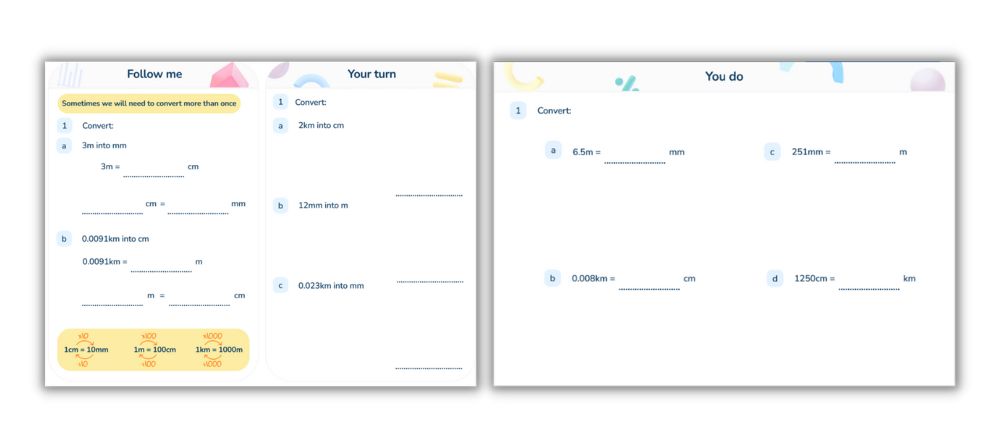
via an ‘I do, we do, you do’ structure (adapted as appropriate to the age
of the learner from KS2 to GCSE level maths).
The most effective tuition is tailored to students’ specific needs. To identify those needs, you will need an initial diagnostic assessment to diagnose learning gaps and misconceptions. This will ensure that tutoring is focused on the areas that will have the greatest impact on student outcomes from the first tutoring session.
If possible, conduct ongoing assessments to ensure that the content remains relevant to the pupil and their learning gaps.
At Third Space Learning, all students begin with an online diagnostic assessment to establish their baseline knowledge.
Each question is multiple-choice with one correct answer and three distractors. Each distractor reflects a specific misconception.
At the end of each session, students answer a quick series of questions independently.
Post-session questions help us continuously update each pupil’s personalised learning journey, reteaching where necessary and progressing when they are ready.
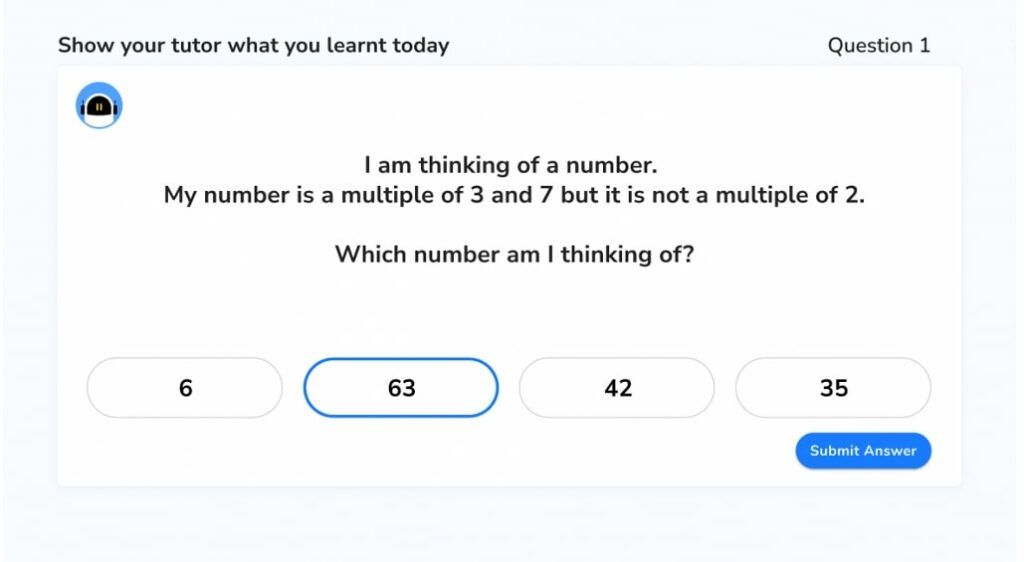
4. Choose how it will be taught
The resources, lessons and pedagogy must align with your curriculum.
For example, if your school teaches for maths mastery, ensure that you find a tutor who aligns with this.
When looking for a GCSE maths tutor, you will want students to practise exam-style questions. But…
- How are these being used?
- How will tutors ensure students are engaging with and fully understanding the questions?
- How will they encourage conceptual understanding over procedural knowledge?
Maths can be hard and it requires students to be reflective, to persevere and to draw on a range of other metacognitive strategies. The best maths tutoring won’t ignore this – it will be embedded in their approach.
The EEF maths report found that discussion and dialogue are useful tools for developing metacognition. Maths tutoring, especially one to one tutoring, offers a unique opportunity for purposeful high-quality talk for maths that is not always possible in whole class settings.
Ask the tutoring provider about their approach to learning and, if possible, request a trial session or watch videos of live lessons to see this approach in action.
After just one term of tuition, every student in Third Space Learning’s GCSE programme will have worked through at least 48 exam-style questions, speaking to their subject expert maths tutor one on one for 540 minutes.
During this time, students discuss their ideas and ask questions, all of which develop their metacognitive skills alongside their mathematical understanding.
Watch a GCSE session or primary session with Third Space Learning here.
5. Choose your approach (group or one to one)
Both one to one and group tutoring are effective interventions. However, one to one tutoring is the most impactful delivery method and low attainers are particularly likely to benefit. This is because lessons are tailored to meet the individual needs of the student and misconceptions can be addressed as they occur.
While group tutoring can also offer personalised learning, it requires complex student matching to ensure all students are working on learning objectives that they need extra support with. In addition to challenges in assessment and content planning, tutors of small groups typically require more training and tutoring experience to be effective as it is more challenging to deliver.
It is not only the cost of the intervention, but importantly the cost-effectiveness of an intervention that should be considered. Group tutoring can be up to 6 students. However, the impact of tutoring is significantly weakened beyond groups of 3. This significantly reduces the cost benefit of opting for group tutoring.
By recruiting and training high-quality STEM graduates and undergraduates in India and Sri Lanka, we’re helping to solve three of the biggest barriers to traditional in-school tuition: affordability, recruitment and scalability.
By taking tuition online, schools choosing Third Space Learning benefit from personalised, one to one tuition for roughly one third of the cost of traditional one to one. Sessions and training programmes are designed by UK curriculum experts, ensuring our programme and teaching style is curriculum aligned and that tutors, lessons and resources are high quality.
6. Choose your delivery method (online or in person)
Research has found that in person tutoring offers no significant benefit over online teaching and the effects of both are similar. It therefore comes down to the needs and preferences of your context.
Here’s a summary of strengths and weaknesses for both to help you make a decision for your school’s needs.
In person tutoring
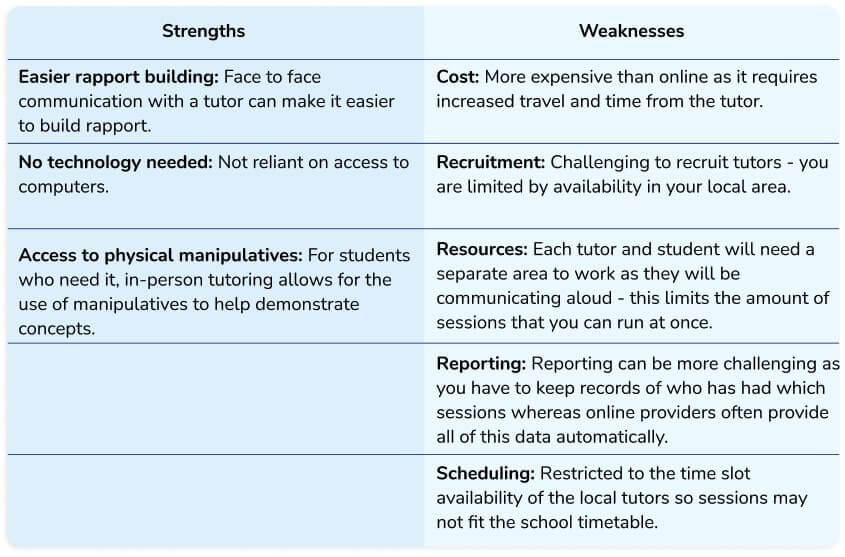
Online tutoring
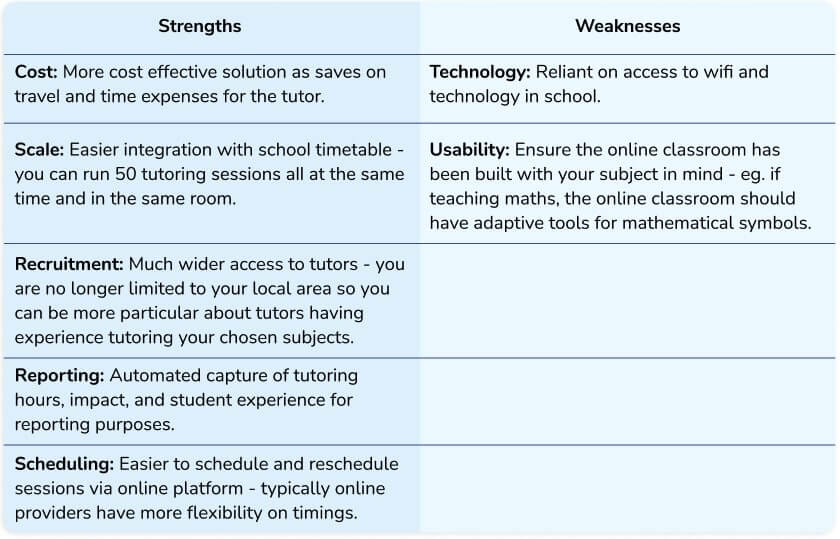
Third Space Learning’s online classroom is designed with maths teaching in mind. It has an easy-to-use interactive whiteboard and quick-click buttons to generate mathematical symbols.
Our online maths tutors have a library of high-quality curriculum-aligned materials to support students.
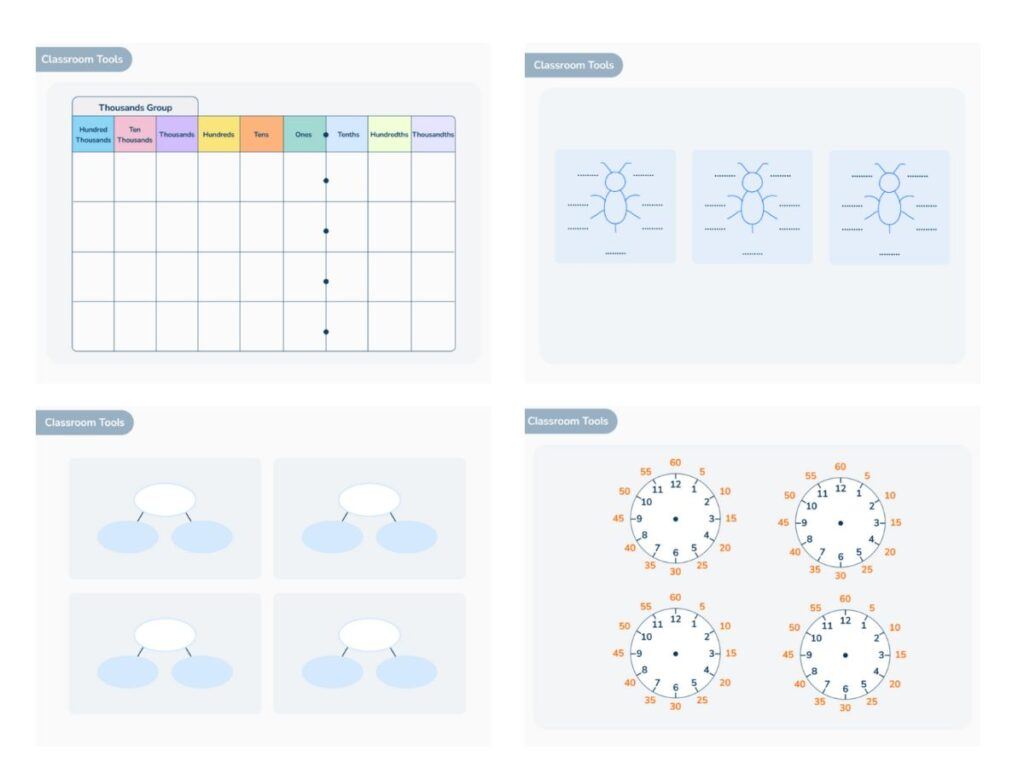
that have been designed by UK curriculum experts.
Our friendly customer support team is on hand to troubleshoot any issues: from initial set up to live support during sessions. Schools are allocated a designated account manager so they’re supported by a familiar face throughout their journey.
Third Space Learning provides every school with free headsets throughout the duration of their programme. This means that you won’t incur additional tutoring costs or spend unnecessary time finding a reputable headset provider.
7. Choose who will deliver the maths tutoring – internal or external provider
There are benefits to both internal and external tutoring providers. Again, the decision will depend on the needs of your context.
If you opt to use internal staff, consider which staff members will deliver effective maths tutoring and what support they will need.
For example, when teaching assistants deliver maths tutoring, it is most successful when it is structured and TAs receive high quality support and training from teachers with several years of experience. According to the EEF, when TAs are not given this support, it can negatively impact students’ learning outcomes.
Additionally, consider:
- Additional workload on existing staff;
- Using teacher’s non-contact time for tutoring;
- Finding cover for teachers’ main lessons when they are tutoring.
Advantages of using an external provider to deliver maths tutoring:
- Less impact on staff workload: Using external providers frees up your teachers to do what they do best
- Easier to manage: A good external provider will take care of managing the intervention with minimal disruption to the school
- Quality assured: Through the National Tutoring Programme Funding, schools can work with external tuition providers that have been quality assured by the DfE, including qualifications and DBS and equivalent checks
- Better monitoring and reporting: It’s in an external provider’s interest to provide detailed progress reports to ensure you can see impact and continue to use them.
READ MORE: Best online tutoring website
Our tutoring model is cost and time-effective. Multiple students can receive personalised, one to one online lessons simultaneously.
Getting set up is quick and easy. We take care of the recruitment, training and administration of staffing.
Each school is assigned a dedicated Account Manager who will:
- Guide schools through the onboarding process;
- Troubleshoot any issues that may arise;
- Be on hand to ensure the smooth running of your tuition.

8. Choose when to schedule maths tutoring sessions
You’ll need to decide both how long you’d like the tutoring programme to run and how long each session should be.
Research suggests that a 12-15 week programme is most effective. In our experience, schools using Third Space Learning rotate their cohort every 1-2 terms. Ongoing assessments and regular progress reports will help you to understand progress and prioritise students, swapping in and out students to maximise impact.
The EEF Toolkit found that frequent sessions that last up to an hour typically show the greatest impact. In our experience, hourly sessions once a week is enough time to maximise fluency and retention, while providing time for greater depth and to address misconceptions.
If the intervention is taking place during the school day, consider the timetabling to ensure that students do not miss out on the core curriculum. Equally important is that students are not always being removed from lessons they usually enjoy as this will have a detrimental effect on motivation and engagement in lessons.
Leaders will need to be flexible in their approach to avoid this, for example by rotating tutoring sessions times or holding sessions during form time. If holding sessions before or after the school day, permission and buy in from parents is critical to ensure attendance!
As in-school tutoring specialists, we’ve designed our programme with schools in mind. Time slots are available throughout the school day. When schools sign up, they can choose which work best for them and are able to change their regular slot at any time. School holidays and half-term breaks are built into our programme to reduce the number of missed sessions.
Teachers are reminded of upcoming sessions 48 hours in advance and if students know they won’t be able to attend, teachers can contact our friendly customer service team who can cancel sessions and issue a credit to be used in the future. With less than 24 hours notice, absent students can be swapped with another.
How to make your maths tutoring budget go further
Tutoring is an effective use of your budget but it can be costly. You’ll want to make sure you’re getting maximum value for your money. Here are a few ideas to make your budget go further and to make the greatest impact on your students:
1. Go online
Online tutoring typically has lower overhead costs so it is often cheaper than in-person tutoring. Research has found the effects are similar, so you can save on costs without affecting impact.
Traditionally, there have been concerns over the quality and engagement of online options but online tuition is becoming the preferred approach by students and teachers, likely due to the considerable shift in the online learning landscape during the Covid-19.
2. Provide support for multiple students at one time
The more students you can support at one time, the more cost-effective your intervention strategy will be.
Group tutoring will support this but once groups become larger than 3 students, impact reduces greatly. One to one tutoring allows for maximum impact on pupil progress but can traditionally be both more expensive and more difficult to organise, especially face to face when you are juggling timetables and room availability.
Online one to one tutoring enables multiple students to receive tailored support at the same time, in the same room.
3. Prioritise personalised learning
Tutoring is most effective when it is targeted on closing learner’s individual gaps. If tutoring is not doing this, you risk wasting budget and time on an intervention that will have little impact on pupil progress.
To personalise learning in tutoring sessions, it is necessary to first identify learner gaps through a sensitive and thorough diagnostic assessment. This will inform what content needs to be covered in sessions and what content students are already secure in.
It is possible to provide personalised learning journeys in group tutoring sessions but will require careful grouping and planning to ensure students share the same learning gaps. One to one tutoring lends itself best to personalised learning.
READ MORE: Assess KS2 Learning Gaps
4. Choose interventions that save time
Along with the actual delivery of sessions, tutoring requires time and resources spent on careful planning and organisation, including:
- Recruiting and training staff to deliver the intervention
- Diagnostic assessment before students start
- Designing and sourcing tutoring material tailored to the needs of the students being supported
- Managing scheduling and attendance
- Reviewing and assessing pupil progress
- Communicating progress with class teachers
- Reporting, for example on the use of funding and impact on attainment
If these elements are taking up hours of the maths lead or SLT’s time, it is not a cost effective tutoring strategy.
Online tutoring options can be time-effective as certain elements, including reporting and assessment, can be automated.
Schools using Third Space Learning have on-demand access to pupil reports. Each school receives a dedicated Account Manager to support them.
The Department for Education found that the additional admin time needed to implement tutoring in schools was a key challenge for senior leaders, who cited recruitment as a key issue. This is an issue facing maths in particular which, as you will be well aware, is one of the hardest subjects to meet teacher recruitment targets.
Here at Third Space Learning, we combat difficulties in recruitment by tapping into the global talent market.
Our tutors are all STEM and maths studies university level graduates and undergraduate university students based in India and Sri Lanka. We recruit and train subject experts who must successfully pass a rigorous training programme designed by UK curriculum specialists and former PGCE qualified teachers with extensive teaching experience working in UK schools. Once tutors begin delivering sessions, they receive regular feedback, training and CPD to continue developing as educators.
46% of tutors have graduated with a BSc, masters degree or equivalent maths degree and now work full time for Third Space Learning.
5. Look for added benefits
If you opt for maths tutoring with an external partner, look for added benefits to help your budget go further. This might include:
- Lesson resources
- CPD
- Technology
At Third Space Learning, premium access to all our Maths Hub resources, including worksheets and ready-to-go lessons, is included at no additional cost for schools signed up for one to one primary school tutoring.
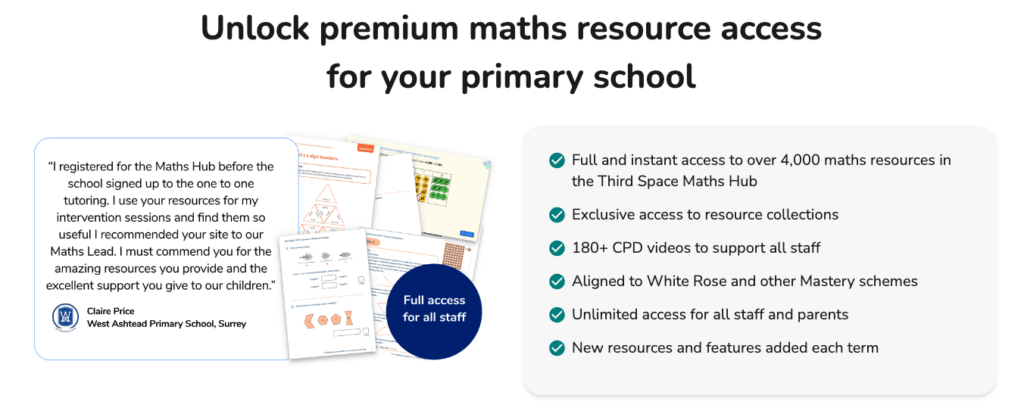
We also have a free secondary maths resources library where you can download free GCSE maths revision resources, including maths revision guides, GCSE maths worksheets, GCSE maths practice papers and videos to support GCSE students and teachers. This means all pupils in a school can benefit, not only those receiving tutoring.
How to make maths tutoring a success in your school
Once you’ve decided on the essential elements of your maths tutoring strategy and decided how to best make it work in your context, you can move on to the next stage: ensuring its delivery is a success.
Here are three key themes we’ve identified in schools with the most successful tutoring programmes:
- Focus on attendance
- Make maths tutoring engaging
- Create a sustainable tutoring model
1. Focus on attendance
Student attendance is the most fundamental requirement for successful implementation of tutoring – there is no point spending time and budget on maths tutoring that is poorly attended.
Here are some of the most successful measures implemented by us as providers and the schools we work with to promote good attendance to tutoring:
- Prioritise relationships between tutors and their students: This is a low-cost approach that can have real impact on attendance. If a positive relationship and learning environment is established early, students are far more likely to attend.
- Reminders to students: This is especially important for larger schools and secondary schools. Students have busy lives and many are experiencing managing their own schedules for the first time. Reminders could be in school diaries, as emails, in-person – however it’s sent, make sure the message gets received!
- Parental buy-in: The EEF found that where tutoring programmes include sessions for parents or carers, this secures buy-in and improves attendance and engagement.
- Appoint a tutoring rep: This will raise the profile of tutoring in school and reduce stigma.
2. Make maths tutoring engaging
Even if students are attending sessions, if they are not engaging with the programme, tutoring will have little impact on outcomes.
Here are some ideas to drive engagement in your maths tutoring sessions:
- Select the right kind of tutoring for student needs: Many of the challenges with engagement can be addressed before the first lesson by identifying the needs of your students and selecting the best approach.
For example, some students might need behavioural or socioemotional learning interventions before attempting academic interventions. Other students may be better suited to one to one over group tuition, and vice versa. - Interaction and purposeful talk: All teachers wish they could give every pupil in their class individualised support and interaction, but in a class of 30 students this is often impossible.
Maths tutoring offers a unique opportunity to discuss mathematical concepts in a supported environment. Ensure tutors are trained in making the most of this and can draw out even the least engaged students’ ideas. - Prioritise relationships between tutors and their students: As teachers, you will be well aware of the importance of positive relationships with learners. Each and every tutor will have their own strategies to establish this but ensure it is embedded and prioritised.
3. Create a sustainable tutoring model
For a tutoring programme to be successful, it’s important for schools to consistently monitor and evaluate the impact of tutoring, and adapt as necessary in response to challenges that inevitably arise.
In the EEF tutoring report, it was identified this as a key principle of tutoring and suggests that monitoring can include:
- Observations
- Staff, pupil and parent feedback
- Attendance data
- Assessment data
Data gathered from this can then inform future planning and any changes that are needed to support the success and ongoing participation and engagement in tutoring.
Maths tutoring FAQs
The Department for Education estimates that in-school tutors cost on average £18 per hour per pupil, however prices vary greatly depending on delivery method and group size.
The best way to tutor maths is to first identify learning gaps and misconceptions and to use this information to plan and deliver personalised learning to address these. This will require a sensitive diagnostic assessment and on-going assessment to continually assess progress and personalise each learning journey.
Yes. At secondary school, small group tutoring can result in an additional 2 months’ progress. One to one tutoring is most effective, resulting in an additional 4 months’ progress. However, it can be even more impactful to start tutoring at KS3 and earlier to address gaps early.
DO YOU HAVE STUDENTS WHO NEED MORE SUPPORT IN MATHS?
Every week Third Space Learning’s maths specialist tutors support thousands of students across hundreds of schools with weekly maths tuition designed to plug gaps and boost progress.
Since 2013 these personalised one to one lessons have helped over 169,000 primary and secondary students become more confident, able mathematicians.
Learn about the diagnostic assessment or request a personalised quote for your school to speak to us about your school’s needs and how we can help.
